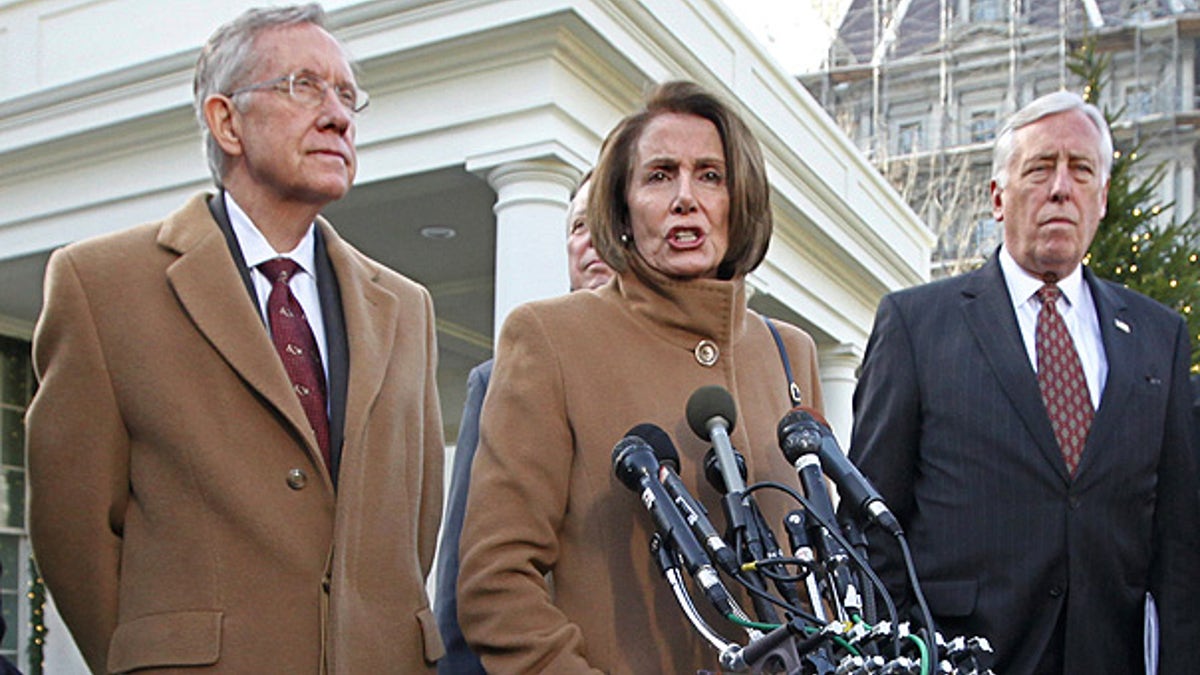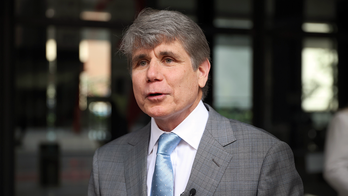
Dec. 9: House Speaker Nancy Pelosi is flanked by Senate Majority Leader Harry Reid, left, and House Majority Leader Steny Hoyer, outside the White House. (AP)
Senate Democrats may go into the bipartisan health care reform summit later this month holding a legislative gun to Republicans' heads.
Some Democrats are readying a health care reform "Plan B" in case negotiations at the half-day televised forum on Feb. 25 go nowhere. The plan would involve passing part of the imperiled health care bill using reconciliation, a controversial procedural maneuver that would allow the package to pass with 51 votes, as opposed to the usual 60 required to overcome a filibuster.
"I think a decision has just been made -- we're just going to go ahead" with a reconciliation bill, Sen. Tom Harkin, D-Iowa, told reporters.
A senior Democratic Senate aide clarified that Democrats are heading in that direction, though they are waiting to see what happens on Feb. 25 before making a decision.
President Obama on Friday invited three dozen Republicans and Democrats to participate in the summit.
In its invitation, the White House argued that remaking health care was imperative, and Obama challenged Democrats and Republicans to come up with comprehensive bills before the Blair House event -- legislation that would be posted online.
Citing bills passed in the House and Senate, the White House said "this is the closest our nation has been to resolving this issue in the nearly 100 years that it has been debated. The Blair House meeting is the next step."
White House Chief of Staff Rahm Emanuel and Health and Human Services Secretary Kathleen Sebelius cited the recent 39 percent rate hikes by Anthem Blue Cross in California as urgent proof the overhaul effort must be completed.
"As the president noted this week, if we don't act on comprehensive health insurance reform, this enormous rate hike will be 'just a preview of coming attractions,"' they wrote.
The letter was sent to McConnell, Boehner, Senate Majority Leader Harry Reid, D-Nev., and House Speaker Nancy Pelosi, D-Calif.
The White House named 21 lawmakers the president wants to attend the Feb. 25 event: the top leaders in the House and Senate and of the committees with jurisdiction over the health legislation. Obama also invited the top four leaders to invite four more lawmakers each, bringing the total to 37 -- 20 Democrats and 17 Republicans.
But if a bipartisan solution cannot be hashed out, Democrats have an alternative plan.
Under the Plan B, the House would pass the version of the health care reform the Senate passed on Christmas Eve. From there, the Senate would use reconciliation to pass certain changes to the health care bill to keep it more in line with House Democrats' wishes. Finally, Congress would tackle other non-budgetary issues, like abortion funding, that cannot be addressed in the reconciliation process.
Senate Democratic leaders prefer not to go the reconciliation route. Moderate Democrats are resistant, and Republicans are downright opposed. House Minority Leader John Boehner, R-Ohio, and House Minority Whip Eric Cantor, R-Va., wrote to White House Chief of Staff Rahm Emanuel this week urging the administration to take reconciliation off the table as an "important show of good faith to Republicans and the American people."
But Harkin is pitching the threat of reconciliation as an effective negotiating tool.
"This is what we've got. What do you have?" Harkin said, posing the question to Republicans.
Republicans have a health care plan from Rep. Paul Ryan, R-Wis. -- but at the same time, GOP leaders are urging President Obama to start from scratch on health care reform, something that appears to be a non-starter.
Obama said this week he's willing to start "from scratch" in terms of hearing out ideas, but he rejected the notion that he and Congress should embark on another year of navigating legislation through multiple committees.
This may leave both parties just as divided after the conference as they were before, and has Republicans questioning whether the meeting will serve as anything other than "theater."
Sen. Judd Gregg, R-N.H., told Fox News on Friday that he's willing to come to the summit with "substantive" ideas in hopes of hammering out something "constructive." But he expressed doubts.
"This could just be another political theater, then, as far as I know," Gregg said. "I just don't know which way it's going to go. And I really don't know what the goal of the president is."
Sen. Charles Grassley, R-Iowa, one of three Senate Republicans who was a party to failed bipartisan health care talks last year, also questioned what the Feb. 25 meeting may produce.
"I think it's going to take quite a bit to restart (the health care reform effort)," he said. "The public has studied this legislation. They don't like it. And I think it's a case of starting over, and will the president be willing to start over."
Health care reform bills, having passed both the House and Senate late last year, seemed to be on course for the president's signature until Republican Scott Brown won election to the Senate in an upset victory in Massachusetts. The victory deprived Democrats of their 60-vote supermajority, shook their confidence in the health bill and ultimately sent it to the sidelines.
Obama has pledged not to abandon health care reform, though he has turned his focus to other issues, such as jobs creation and the repeal of the "Don't Ask Don't Tell" policy banning gays from serving openly in the military.
Fox News' Trish Turner contributed to this report.
























